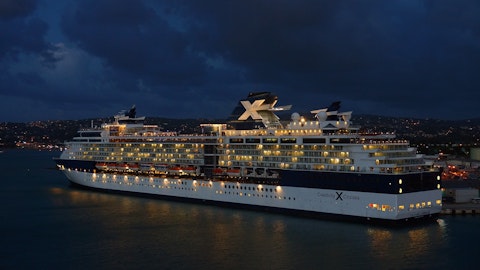So we had a little bit of a better base, but we’re closing that gap every single week, and we expect to be in really good shape as we head into 2024. We have not seen any real impact yet other than the cancellations from Egypt with regards to what’s going on in the world. The booking window for next year remains pretty consistently in that nine – averaging at nine month window. When people are booking. So no real change yet. Obviously, we don’t know if that continues. But today, we’re not seeing any impact.
Unidentified Analyst: Okay. Great. Thanks Craig.
Craig Felenstein: Thank you.
Operator: Next question on the line is from Alex Fuhrman from Craig-Hallum Capital. Please go ahead.
Alex Fuhrman: Hi, guys. Thanks for taking my questions. I wanted to ask about the occupancy. It looks like unchanged here from last year at 81%. Can you kind of break down what the difference is between that 81% and the 90% or so that you were operating at for the most part, prior to the pandemic. I think you mentioned that short-term cancellations are starting to come down a little bit. Was that still the lion’s share of the delta there in Q3? And then how much of the shortfall in occupancy relative to 2019, is it a function of needing more time to ramp up itineraries on the new ships, especially in the shoulder season.
Sven-Olof Lindblad: Yes. So I’m going to — it’s a complicated equation, but I’ll try and keep it as clear as I possibly can. So we have certain products, which are drivers for new people coming in. Mostly bucket list destinations and certain like Alaska, for example, in the Galapagos and then we have a certain number of itineraries, particularly on the blue water ships that are more esoteric in the South Pacific, Papua New Guinea, certain parts of the Arctic, South America. And these are really quite heavily dependent on past guests. And so we had 2020 and 2021 and then a weaker two — a bit of a weaker 2022, where we were not generating the same numbers of new guests. And so the pipeline got stagnant, if you will, or didn’t expand in those years.
And so our inventory was a bit out of balance. And also a key factor was that we had a lot of new itineraries planned primarily involving parts of Russia, the Northeast passage, for example, that had originally just completely flown off the shelves and filled. And obviously, we had to reroute and involve a lot of geography that was less new and a lot of those past guests had already been through those areas. So there’s a bit of rebalancing of inventory needed until that pipeline gets back to the level that it’s meant to be in order to provide the fuel, if you will, for those esoteric programs. And we’re sort of in the middle of that. For example, we’ve already done some of that rebalancing for ’24 and we are going to do some more work on that front for ’25.
And by ’26, I think we’ll be back sort of in a normal cadence again.
Alex Fuhrman: Great. That’s really helpful. Appreciate that.
Operator: [Operator Instructions] It appears we have no further questions.
Craig Felenstein: Great. Thank you, operator, for your time. Thank you, everybody else for joining us. I know it’s a busy morning, on a variety of fronts. So if you have additional questions, please feel free to reach out, and we’re happy to continue the discussion.
Sven-Olof Lindblad: Thank you.
Operator: This concludes today’s presentation. You may now disconnect your lines, and enjoy the rest of your day.
Follow Lindblad Expeditions Holdings Inc. (NASDAQ:LIND)
Follow Lindblad Expeditions Holdings Inc. (NASDAQ:LIND)
Receive real-time insider trading and news alerts



